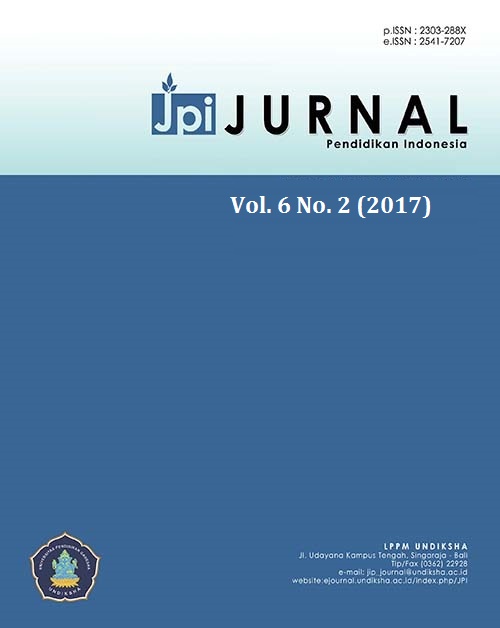English Teachers’ Perspectives: Peer-Assessment In 2013 Curriculum
DOI:
https://doi.org/10.23887/jpi-undiksha.v6i2.10386Keywords:
2013 Curriculum, affective aspect, peer-assessment, teachers’ perspectivesAbstract
The implementation of 2013 curriculum results in a number of consequences in teachers’ negative conceptions of the peer-assessment implementation in the classroom. This current study aimed at revealing English teachers’ perspectives of peer-assessment as an assessment method in assessing students’ affective aspects. A survey research was conducted in the study which deployed questionnaires with 30 statements. 30 English teachers who applied 2013 Curriculum in their teaching and learning process participated in this study and the results exposed that most of these English teachers perceive positively the implementation of peer-assessment regarding its relation with character education and students’ attitude towards peer assessment. However, the application of peer-assessment for assessing students’ affective aspect still needs to be improved since the fairness of peer-assessment application is still questionable by the teachers. Therefore, further development of peer-assessment is required in order to promote its positive aspects.
References
Azarnoosh, M. (2013). Peer assessment in an EFL context: Attitudes and friendship bias. Language Testing in Asia, 3(11): 1-10. Retrieved from http://www.languagetestingasia.com/content/3/1/11
Casallas, D. F. U. & Castellanos, F. S. P. (2016). Argumentation skills: A peer assessment approach to discussions in the EFL classroom. Profile, 18(2): 111-123. DOI: 10.15446/profile.v18n2.53314
Cheng, W. & Warren, M. (2005). Peer assessment of language proficiency. Language Testing, 22(1): 93-121. DOI: 10.1191=0265532205lt298oa
Fauzan, U. (2016). Enhancing speaking ability of EFL students through debate and peer assessment. EFL Journal, 1(1):.49-57. Retrieved from https://www.researchgate.net/publication/301736783
Fazel, I. (2015). A step in the right direction: peer-assessment of oral presentations in an EFL setting. Reading Matrix: An International Online Journal, 15(1): 78-90. Retrieved from https://www.researchgate.net/publication/278027356
Finch, A. E. (2014). Authentic assessment: Implications for EFL performance testing in Korea. Secondary Education Research, 49: 89-122. Retrieved from https://www.researchgate.net/publication/267362968
Friedman, B. A., Cox, P. L., & Maher, L. E. (2008). An expectancy theory motivation approach to peer assessment. Journal of Management Education, 32(5): 580-612. DOI: 10.1177/1052562907310641
Indonesia Ministry of Education and Culture Regulation, No. 23, 2016, about Educational Assessment Standard.
Indonesia Ministry of Education and Culture Regulation, No. 53, 2015, about Learning Outcomes Assessment by Teacher in Elementary and High school.
Indonesia Ministry of Education and Culture Regulation, No. 54, 2013, about Qualification Competence Standard for Elementary and High school.
Indonesia Ministry of Education and Culture Regulation, No. 104, 2014, about Learning Outcomes Assessment by Teacher in Elementary and High school.
Khoshsima, H. & Rezaee, A. (2016). Applicability of peer-dynamic assessment in crowded second language classes. Journal of Language Teaching and Research, 7(5): 929-935. DOI: 10.17507/jltr.0705.13
Lan, Y. J., Sung, Y. T., & Chang, K. E. (2009). Are you listening? The development of online peer assessment system for English oral reading. Proceedings of the 17th International Conference on Computers in Education, 626-628. Retrieved from https://www.researchgate.net/publication/242540628
Otoshi, J. & Heffernan, N. (2007). An analysis of peer assessment in EFL college oral presentation classrooms. The Language Teacher, 31(1): 3-8. Retrieved from https://www.researchgate.net/publication/255950623
Roskams, T. (1999). Chinese EFL students’ attitudes to peer feedback and peer assessment in an extended pairwork setting. RELC Journal, 30(1): 79-123. DOI: 10.1177/003368829903000105
Saito, H. & Fujita, T. (2004). Characteristics and user acceptance of peer rating in EFL writing classrooms. Language Teaching Research, 8(1): 31-54. DOI: 10.1191/1362168804lr133oa
Tišma, D. M. J. (2016) Serbian EFL teachers and learners’ attitudes to peer assessment and the comparison of teacher and peer speaking assessment scores. Nastava i vaspitanje, 65: 379-393. DOI: 10.5937/nasvas1602379J
Zarei, A. A. & Usefli, Z. (2015). The effect of assessment type on EFL learners’ goal-orientation. Journal of Language, Linguistics and Literature, 1(4): 112-119. Retrieved from https://www.researchgate.net/publication/312470871
Downloads
Published
Issue
Section
License
Authors who publish with the Jurnal Pendidikan Indnesia agree to the following terms:
- Authors retain copyright and grant the journal the right of first publication with the work simultaneously licensed under a Creative Commons Attribution License (CC BY-SA 4.0) that allows others to share the work with an acknowledgment of the work's authorship and initial publication in this journal.
- Authors are able to enter into separate, additional contractual arrangements for the non-exclusive distribution of the journal's published version of the work (e.g., post it to an institutional repository or publish it in a book), with an acknowledgment of its initial publication in this journal.
- Authors are permitted and encouraged to post their work online (e.g., in institutional repositories or on their website) prior to and during the submission process, as it can lead to productive exchanges, as well as earlier and greater citation of published work. (See The Effect of Open Access)








